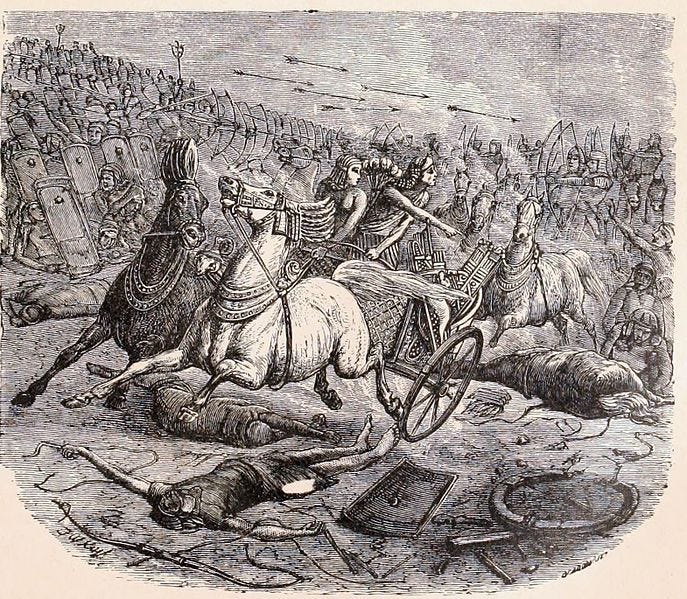Welcome to the July edition of The Worldview Bulletin! Below, Paul M. Gould explains the necessity and blessing of locating our personal stories within God’s story. Paul Copan then surveys recent understandings of the war against the Canaanites in the Old Testament, and sketches his own viewpoint. David Baggett continues his series on Bart and Tony Campolo, critiquing Tony Campolo’s revised beliefs about biblical teaching on sexuality. This is followed by Melissa Cain Travis’s conclusion to her series showing the ineffectiveness of David Hume’s objections to inferring divine design in nature based on the writings of his contemporary, Thomas Reid. We round the issue out with news and resources of note, along with great deals on books and other media.
Thank you for being a subscriber and supporter of The Worldview Bulletin! You make our work possible.
For the Kingdom,
Christopher Reese
Editor-in-Chief
Contents
Part One
Locating Your Life in God’s Story
by Paul M. Gould
Four Approaches to the Canaanite Wars
by Paul Copan
Please see the second email for Part Two of the newsletter.
Locating Your Life in God’s Story
By Paul M. Gould
I’ve been thinking a lot lately about a theology of stories. We love stories, and like everything else, they are a gift to us from our creator. They remind us that we were called to live a dramatic life. And the best stories awaken longing and reveal to us the true story of the world: the gospel. We love stories. We live on stories. And we also live in a story: we see ourselves, or we ought to see ourselves, as part of an ongoing story (this view is called narrativism). We have this intuition that reality itself, and our lives, are coherent and meaningful and so we seek a story that is alive and understanding. In short, we seek to locate our lives in a good and true story (the view that reality itself is a story is called narrative realism). If the story of my life only makes sense when I locate it within a larger divine story, we might ask: how, exactly, do we locate our lives in God’s story?
This summer, I’ve been slowly working my way through Dallas Willard’s wonderful book on spiritual formation called Renovation of the Heart. I heartily and enthusiastically recommend it to you. In his chapter on transforming the will, Willard offers some practical steps for how we might locate our life in God’s story.
The first step in aligning our will with God’s will, according to Willard, is surrender. “When we surrender our will to God we consent to his supremacy in all things.”[1] Surrender, of course, is difficult. And it is difficult to fully surrender. Still, “it is important that we move forward. The center of the self, the heart or spirit, is now willing for God to be God—even if with little hope or enthusiasm.”[2] So, we begin with surrender. We will for God to be God.
The next step is abandonment to God. “If grace and wisdom prevail in the life of the one who only surrenders to God’s will, he or she will move on to abandonment. Then the individual is fully surrendered.”[3] When we fully surrender to God we become whole. Our thinkings and willings and emotions begin to point in the same direction and we center our lives around the good that is God.
The result is contentment. “Beyond abandonment is contentment with the will of God: not only with his being who he is and ordaining what he has ordained in general, but with the lot that has fallen to us.”[4] We find rest in God and enjoy the peace he offers. A content life is a life that bears the fruit of the Spirit. There is joy and love and patience. It is a life full of gratitude, a life that sees all things, including the difficult or bad things, as gifts from God.
Finally, we move from abandonment and contentment to “intelligent, energetic participation” in the divine drama.[5] “We are no longer spectators, but are caught up in a vivid and eternal drama in which we play an essential part. We embrace our imposed circumstances, no matter how tragic they seem, and act for the good in a power beyond ourselves.”[6] As we align our will to God’s will, we fully participate in what God has done, is doing, and will do. We cease wandering and become pilgrims—creatures “on the way” as we journey with wisdom and courage, faith and hope, towards love itself.
How do we locate our lives in God’s story? By surrendering our will to God, which if faithfully followed leads to abandonment of our will to God. As a result, we find contentment in all things and energetically and enthusiastically participate with God as we take up our place in the divine drama.
Notes
[1] Dallas Willard, Renovation of the Heart (Colorado Springs, CO: NavPress, 2002), 150.
[2] Ibid.
[3] Ibid.
[4] Ibid., 151.
[5] Ibid., 151.
[6] Ibid., 151–152.
— Paul M. Gould is an Associate Professor of Philosophy of Religion and Director of the M.A. Philosophy of Religion program at Palm Beach Atlantic University. He is the author or editor of ten scholarly and popular-level books including Cultural Apologetics, Philosophy: A Christian Introduction and The Story of the Cosmos. He has been a visiting scholar at Trinity Evangelical Divinity School’s Henry Center, working on the intersection of science and faith, and is the founder and president of the Two Tasks Institute. You can find out more about Dr. Gould and his work at Paul Gould.com and the Two Tasks Institute. He is married to Ethel and has four children.
Image by Trixie Liko from Pixabay
Four Approaches to the Canaanite Wars
By Paul Copan
In earlier Worldview Bulletin posts I wrote about some topics covered in my forthcoming book Is God a Vindictive Bully? (Baker Academic, October 2022). It’s a book that builds on my earlier Is God a Moral Monster? and my book with Matthew Flannagan Did God Really Command Genocide? In my Vindictive Bully book I try to add as much new content as possible without overlap with the others in this “trilogy.”
Some Warfare Themes from My Vindictive Bully Book
Toward the end of my new book—after discussing punishments in the Mosaic law, God’s hardening Pharaoh’s heart, Elisha and the bears, the imprecatory psalms, and much more, I spend several chapters on Old Testament warfare. The Vindictive Bully book goes into a good bit more detail on the warfare theme and examines key texts such as Numbers 31, Deuteronomy 20, and 1 Samuel 15.
The book also discusses the important term herem (sometimes translated “utter destruction”), which, as John and Harvey Walton in The Lost World of the Israelite Conquest observe, is frequently mistranslated. Instead, they argue for an understanding like “identity-removal”—comparable to the de-Nazification of Germany though the nation overall continued to exist. I add that this term may simply refer to consecration without any killing (e.g., Leviticus 27), exile, or simply victory in battle that includes lots of survivors.
Keep reading with a 7-day free trial
Subscribe to The Worldview Bulletin Newsletter to keep reading this post and get 7 days of free access to the full post archives.




